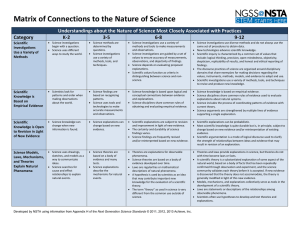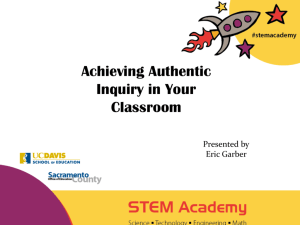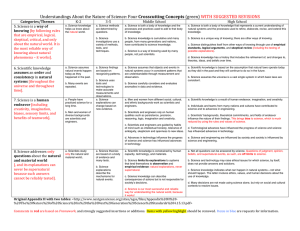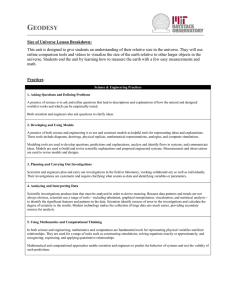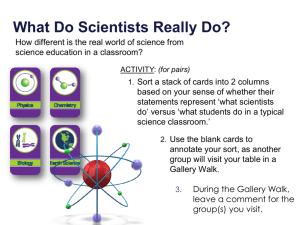Matrix of Connections to the Nature of Science
advertisement
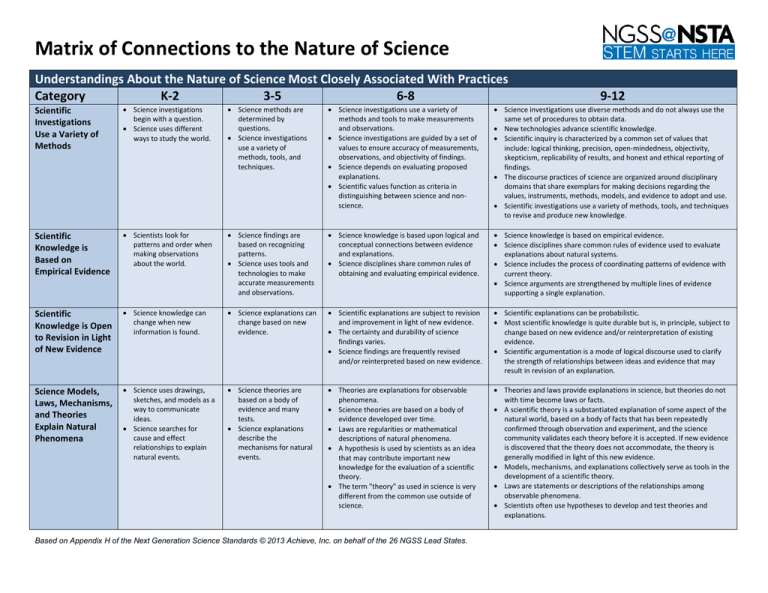
Matrix of Connections to the Nature of Science Understandings About the Nature of Science Most Closely Associated With Practices Category K-2 3-5 6-8 9-12 Scientific Investigations Use a Variety of Methods Science investigations begin with a question. Science uses different ways to study the world. Science methods are determined by questions. Science investigations use a variety of methods, tools, and techniques. Science investigations use a variety of methods and tools to make measurements and observations. Science investigations are guided by a set of values to ensure accuracy of measurements, observations, and objectivity of findings. Science depends on evaluating proposed explanations. Scientific values function as criteria in distinguishing between science and nonscience. Science investigations use diverse methods and do not always use the same set of procedures to obtain data. New technologies advance scientific knowledge. Scientific inquiry is characterized by a common set of values that include: logical thinking, precision, open-mindedness, objectivity, skepticism, replicability of results, and honest and ethical reporting of findings. The discourse practices of science are organized around disciplinary domains that share exemplars for making decisions regarding the values, instruments, methods, models, and evidence to adopt and use. Scientific investigations use a variety of methods, tools, and techniques to revise and produce new knowledge. Scientific Knowledge is Based on Empirical Evidence Scientists look for patterns and order when making observations about the world. Science findings are based on recognizing patterns. Science uses tools and technologies to make accurate measurements and observations. Science knowledge is based upon logical and conceptual connections between evidence and explanations. Science disciplines share common rules of obtaining and evaluating empirical evidence. Science knowledge is based on empirical evidence. Science disciplines share common rules of evidence used to evaluate explanations about natural systems. Science includes the process of coordinating patterns of evidence with current theory. Science arguments are strengthened by multiple lines of evidence supporting a single explanation. Scientific Knowledge is Open to Revision in Light of New Evidence Science knowledge can change when new information is found. Science explanations can change based on new evidence. Scientific explanations are subject to revision and improvement in light of new evidence. The certainty and durability of science findings varies. Science findings are frequently revised and/or reinterpreted based on new evidence. Scientific explanations can be probabilistic. Most scientific knowledge is quite durable but is, in principle, subject to change based on new evidence and/or reinterpretation of existing evidence. Scientific argumentation is a mode of logical discourse used to clarify the strength of relationships between ideas and evidence that may result in revision of an explanation. Science Models, Laws, Mechanisms, and Theories Explain Natural Phenomena Science uses drawings, sketches, and models as a way to communicate ideas. Science searches for cause and effect relationships to explain natural events. Science theories are based on a body of evidence and many tests. Science explanations describe the mechanisms for natural events. Theories are explanations for observable phenomena. Science theories are based on a body of evidence developed over time. Laws are regularities or mathematical descriptions of natural phenomena. A hypothesis is used by scientists as an idea that may contribute important new knowledge for the evaluation of a scientific theory. The term "theory" as used in science is very different from the common use outside of science. Theories and laws provide explanations in science, but theories do not with time become laws or facts. A scientific theory is a substantiated explanation of some aspect of the natural world, based on a body of facts that has been repeatedly confirmed through observation and experiment, and the science community validates each theory before it is accepted. If new evidence is discovered that the theory does not accommodate, the theory is generally modified in light of this new evidence. Models, mechanisms, and explanations collectively serve as tools in the development of a scientific theory. Laws are statements or descriptions of the relationships among observable phenomena. Scientists often use hypotheses to develop and test theories and explanations. Based on Appendix H of the Next Generation Science Standards © 2013 Achieve, Inc. on behalf of the 26 NGSS Lead States. Matrix of Connections to the Nature of Science Understandings About the Nature of Science Most Closely Associated With Crosscutting Concepts Category K-2 3-5 6-8 9-12 Science is a Way of Knowing Science knowledge helps us know about the world. Science is both a body of knowledge and processes that add new knowledge. Science is a way of knowing that is used by many people. Science is both a body of knowledge and the processes and practices used to add to that body of knowledge. Science knowledge is cumulative and many people, from many generations and nations, have contributed to science knowledge. Science is a way of knowing used by many people, not just scientists. Science is both a body of knowledge that represents a current understanding of natural systems and the processes used to refine, elaborate, revise, and extend this knowledge. Science is a unique way of knowing and there are other ways of knowing. Science distinguishes itself from other ways of knowing through use of empirical standards, logical arguments, and skeptical review. Science knowledge has a history that includes the refinement of, and changes to, theories, ideas, and beliefs over time. Scientific Knowledge Assumes an Order and Consistency in Natural Systems Science assumes natural events happen today as they happened in the past. Many events are repeated. People have practiced science for a long time. Men and women of diverse backgrounds are scientists and engineers. Science assumes that objects and events in natural systems occur in consistent patterns that are understandable through measurement and observation. Science carefully considers and evaluates anomalies in data and evidence. Men and women from different social, cultural, and ethnic backgrounds work as scientists and engineers. Scientists and engineers rely on human qualities such as persistence, precision, reasoning, logic, imagination and creativity. Scientists and engineers are guided by habits of mind such as intellectual honesty, tolerance of ambiguity, skepticism and openness to new ideas. Advances in technology influence the progress of science and science has influenced advances in technology. Scientific knowledge is based on the assumption that natural laws operate today as they did in the past and they will continue to do so in the future. Science assumes the universe is a vast single system in which basic laws are consistent. Science is a Human Endeavor Science assumes consistent patterns in natural systems. Basic laws of nature are the same everywhere in the universe. Men and women from all cultures and backgrounds choose careers as scientists and engineers. Most scientists and engineers work in teams. Science affects everyday life. Creativity and imagination are important to science. Science Addresses Questions About the Natural and Material World. Scientists study the natural and material world. Science findings are limited to what can be answered with empirical evidence. Scientific knowledge is constrained by human capacity, technology, and materials. Science limits its explanations to systems that lend themselves to observation and empirical evidence. Science knowledge can describe consequences of actions but is not responsible for society’s decisions. Not all questions can be answered by science. Science and technology may raise ethical issues for which science, by itself, does not provide answers and solutions. Science knowledge indicates what can happen in natural systems—not what should happen. The latter involves ethics, values, and human decisions about the use of knowledge. Many decisions are not made using science alone, but rely on social and cultural contexts to resolve issues. Based on Appendix H of the Next Generation Science Standards © 2013 Achieve, Inc. on behalf of the 26 NGSS Lead States. Scientific knowledge is a result of human endeavor, imagination, and creativity. Individuals and teams from many nations and cultures have contributed to science and to advances in engineering. Scientists’ backgrounds, theoretical commitments, and fields of endeavor influence the nature of their findings. Technological advances have influenced the progress of science and science has influenced advances in technology. Science and engineering are influenced by society and society is influenced by science and engineering.
